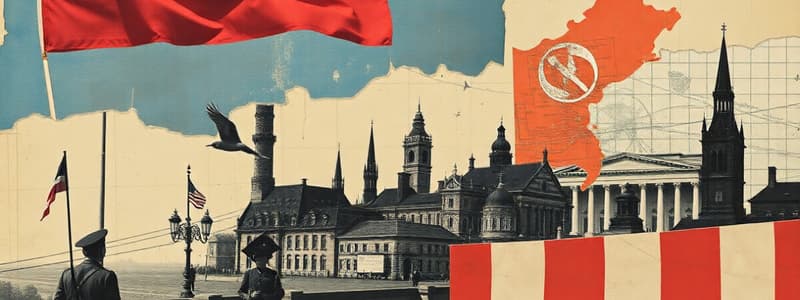Podcast
Questions and Answers
What historical event significantly contributed to the spread of national identity in Europe?
What historical event significantly contributed to the spread of national identity in Europe?
- The Protestant Reformation
- Napoleon's conquests (correct)
- The Industrial Revolution
- The French Revolution
What is a key argument against the concept of a fixed national identity?
What is a key argument against the concept of a fixed national identity?
- National identities are not inherently connected to shared language or cultural practices.
- National identities evolve and change over time, making them fluid and not static. (correct)
- National identities can be used to justify violence and oppression against minority groups.
- National identities are often imposed through political means, rather than arising organically.
What is a potential drawback of the concept of national identity, as discussed in the provided text?
What is a potential drawback of the concept of national identity, as discussed in the provided text?
- It can lead to increased global cooperation and collaboration.
- It can create a sense of belonging and community.
- It can lead to the exclusion of minorities and the persecution of groups considered 'other'. (correct)
- It can promote cultural diversity and tolerance.
What historical event is presented as a key example of the artificiality of national identity?
What historical event is presented as a key example of the artificiality of national identity?
Which of the following concepts offers an alternative to national identity as a source of belonging and community?
Which of the following concepts offers an alternative to national identity as a source of belonging and community?
What is the main argument presented regarding the relationship between nationalism and violence?
What is the main argument presented regarding the relationship between nationalism and violence?
What is one of the potential benefits of expanding identities beyond national borders?
What is one of the potential benefits of expanding identities beyond national borders?
What is the most common and available form of collective identity in the current context?
What is the most common and available form of collective identity in the current context?
Which of the following is NOT mentioned as a potential alternative to national identity?
Which of the following is NOT mentioned as a potential alternative to national identity?
What is a central argument made regarding the future of national identities?
What is a central argument made regarding the future of national identities?
What is the main reason why the concept of the nation is considered a modern invention?
What is the main reason why the concept of the nation is considered a modern invention?
What role did empires play in the development of national identity?
What role did empires play in the development of national identity?
How did the French Revolution contribute to the concept of a nation-state?
How did the French Revolution contribute to the concept of a nation-state?
Which of the following tactics was NOT used by Napoleon Bonaparte to promote national identity in France?
Which of the following tactics was NOT used by Napoleon Bonaparte to promote national identity in France?
How did industrialization contribute to the unification of France?
How did industrialization contribute to the unification of France?
What was the role of mass media in shaping national identity?
What was the role of mass media in shaping national identity?
Which of the following best summarizes the argument presented in the text?
Which of the following best summarizes the argument presented in the text?
What is the main point of the text's discussion of France?
What is the main point of the text's discussion of France?
What is the main difference between subjects and citizens?
What is the main difference between subjects and citizens?
Study Notes
How the Idea of the Nation Took Over the World
- The concept of a nation, a country defined by shared heritage and identity, is a modern invention deeply ingrained in global understanding.
- A nation comprises people, land, and state, powerfully shaping politics and identities.
- The modern concept of countries is relatively recent, not an ancient or natural phenomenon.
The Flawed Logic of National Identity
- National borders often do not reflect shared ethnicity or language.
- Genetic research shows people within a nation often share more genetic similarities with neighbors than with fellow countrymen.
- National languages are frequently recent developments; for example, French's dominance in France emerged only in the early 1800s.
- A unified national identity, as seen in France or China, is relatively recent and primarily held by political elites, not the general population.
The Rise of Empires and National Identity
- Empires, although appearing unified, did not create widespread national identity among their subjects.
- Individuals in the French Kingdom, for instance, primarily identified with their villages or towns, not a larger French identity.
- Empires contributed to national identity by enforcing centralized control and promoting a unified people under a single ruler.
France's Nation-Building Process
- The French Revolution promoted the nation-state concept but did not immediately forge a strong French identity.
- Napoleon Bonaparte's actions significantly advanced national identity:
- Utilized symbols, songs, and art to foster patriotism.
- Recruited soldiers from various regions, creating a sense of shared purpose.
- Shifted loyalty away from the Catholic Church toward the nation.
- French industrialization further consolidated national identity:
- Transportation networks linked communities.
- Urban centers integrated diverse regional identities.
- A national school system promoted French language and national pride.
- Mass media, such as newspapers, facilitated communication about national events, further shaping national identity.
- A modern French identity, similar to the current perception, emerged only in the late 19th or early 20th century.
The Invention of the Nation and its Global Spread
- The concept of a nation is a product of complex historical processes—both government-driven and grassroots.
- Napoleon's conquests spread the national identity idea, inspiring revolutions and nationalist movements across Europe.
- The 1861 unification of Italy demonstrates the artificial nature of national identity; only a small portion of the population spoke Italian at the time.
- Nation-building is a prolonged and gradual process, sometimes taking more than a century.
The Dark Side of Nationalism
- The concept of a nation can lead to the persecution of minorities through the exclusion of those deemed non-conforming to a perceived national character.
- Nationalism played a role in the outbreak of World War I as nations sought to define their territories and interests.
- 20th-century nationalist fervor contributed to the rise of fascism and genocide.
- European colonialism and the ensuing desire for self-determination among colonized populations contributed to the global spread of the nation-state model.
The Continuing Impact of the Nation
- The nation remains a significant force shaping global understanding despite its relative novelty.
- Critical analysis of nationalism and its history is essential, considering its potential for both progress and violence.
The Imperfect Nation
- National identities are inherently flawed due to their constant evolution. National identities frequently generate conflict, stemming from territorial claims and defining national membership.
- Nationalistic fervor often marginalizes or excludes groups, establishing a "us vs. them" dynamic.
- Alternative systems of organization and identity beyond national identities deserve exploration.
The Fluidity of National Identity
- National identities are dynamic and change over time.
- French identity is progressing toward greater inclusivity, accommodating various races, religions, and birthplaces.
- However, there's resistance to this shift in inclusivity, maintaining a traditional and exclusive definition of French identity.
- The human need for collective identity persists, with national identity currently providing the most accessible form.
Expanding Identities and Cosmopolitanism
- Expanding identities beyond geographical limitations is an alternative to national ones.
- The European identity, based on shared values and belonging, avoids the dangers of national conflict and exclusion.
- A cosmopolitan identity, embracing a global perspective, involves living in diverse cities, appreciating varied cultures, and traveling internationally.
- Such identities challenge traditional national identities.
Replacing National Identity
- Alternatives to national identity—religion, profession, and local communities—offer avenues for belonging and community.
- Encouraging inclusive communities and identities is crucial.
- Shifting away from "us vs. them" perspectives and embracing inclusivity is vital.
The Role of "Them"
- The concept of an "enemy" or "other" can drive nationalist fervor, leading to an "us vs. them" mentality.
- This framework of fear and opposition can feel psychologically empowering; it enhances national identity.
- Recognizing this psychological drive is crucial so that we can actively move beyond such harmful narratives.
Nations as Ideas
- National identities are fluid and dynamic, and we're still learning effective ways to manage them peacefully.
- National identities aren't fixed; they evolve with societal perspectives—and willingness for constructive adjustment.
- Changing our views on national boundaries and their constituencies is an essential step in advancement.
- While national borders often appear static, they're not fixed but adaptable.
- Exploring global organization systems that move beyond narrow national identity structures is essential for the future.
Studying That Suits You
Use AI to generate personalized quizzes and flashcards to suit your learning preferences.




